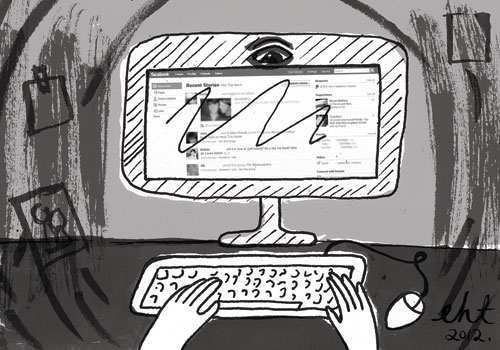Ah, what a wonderful world we live in. With just the click of a button you can view the latest drop (or rise!) in the stock market, order clothing, download a textbook or stalk that professor you’re crushing on.
Facebook and privacy

Ah, what a wonderful world we live in. With just the click of a button you can view the latest drop (or rise!) in the stock market, order clothing, download a textbook or stalk that professor you’re crushing on.
With so much technology readily at your disposal, almost anything is possible. But is that a good thing? A woman from Ontario, Ore., was recently fired from her job because of her personal Facebook posts.
“I was mortified; I was so angry and upset and immediately I was going through the people on my friends list who could have shown it to them,” said Marci Brabb, who worked at Oregon Natural Market. Brabb went on to say that her former boss had told her she was being terminated due to her Facebook posts, and that boss also showed her a folder that had “pages and pages” of her Facebook posts “printed out and stapled together.”
Although she had never explicitly used her company’s name or the names of coworkers in any of her posts, Brabb was still accused of slandering the company. Brabb stated that she used high privacy settings, but her boss was still able to get a hold of her various posts.
“I figured it was just some way to get if off my chest, I didn’t use any bad language or anything like that, I was just having kind of a rough time,” Brabb said.
While Brabb may have just been unlucky in terms of her Facebook use, the situation does raise an important question: Is an employer going through an employee’s social networking profile an invasion of privacy, even if slander is involved?
Facebook’s newest feature, the highly criticized ‘Timeline,’ allows users to create exactly what the title suggests: a timeline-styled profile that sorts events by their respective dates. Sounds fun, right? Along with a new layout, Timeline comes equipped with user-friendly privacy options.
The problem with that is that the default options are very low-security, leaving a lot of personal information and content readily available to anyone also using the website. Anyone with common sense would generally check and change their privacy settings, but sadly that excludes a large portion of the people using Facebook.
Facebook’s terms of agreement explicitly express that what you post is up to your own discretion, which means if the wrong people see it, it is your own fault.
It is unfortunate that Brabb had to learn this the hard way, although it seems there may have been more going on. But you cannot go blaming social media for things that happen as a result of your own doing.
Before you post anything on your Facebook, Tumblr, Twitter, etc., think about who the immediate audience will be. If what you are posting will offend friends and family, is it worth the ensuing arguments and annoying online notifications? Luckily, most social media websites provide a “block” option that allows you to block questionable content and posts from friends, family, coworkers, etc.
However, before you go blocking your pro-choice posts and music videos from your grandparents, don’t go block crazy. There are rumors that employers can bypass blocks and privacy settings. Whether or not that is true is yet to be determined, but be careful!
Brabb stated that she never used her company’s name in any of her posts. If you feel the need to complain about your job on Facebook, be cautious. Just because you do not use the company’s name doesn’t mean it can’t be slander. If your friends know where you work, and they see you complaining about your job, any interest they may have had in doing business with that company could be squashed.
If you need to vent, try something simple like: “Today was tough, glad I made it out alive,” or something that doesn’t necessarily allude to work. Be vague! It might annoy your friends and family, but are the tiny details worth your job?
The National Labor Relations Act protects some social network activity. It prohibits employers from disciplining or firing people for “concerted activity.” Concerted activity is any activity that concerns an employee’s right to discuss wages, hours and working conditions with coworkers, friends and family.
“They [the National Labor Relations Board] want them to be able to talk about if there are oppressive conditions from supervisors, how do they feel about their wages—that act gives them the right to talk about those things together,” said Lisa McGrath, a new media attorney based in Boise, Idaho.
Informing friends and family about your life via Facebook and other social networking websites is fine and dandy, but remember that other people can see what you post, whether you like it or not. Even with high privacy settings, some things slip through the cracks. The Internet, and Facebook itself, are not all-powerful entities; they are human-made creations with flaws and should be treated as such.
If you do switch your Facebook to the new Timeline feature, check your new privacy settings, read the user agreements and be mindful of what you post and who is going to see it. Entertainment isn’t worth losing a job, is it? Be thoughtful as you make your way through the interweb pathways.



